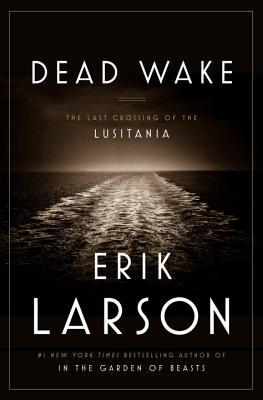 Erik Larson's books apparently have appeal to me, since all but one of them are on my "to read" shelf. I think he just covers historical moments that I find particularly interesting. From the look of his books (and my experience with this one) he doesn't feel the need to write broad, sweeping historical narratives, but rather focuses on smaller moments and events in the context of the larger ones everyone studies so intently. I knew about the Lusitania, a large passenger liner that sailed in the early twentieth century, and had a conception about it that a lot of people probably shared: that when Germany sank it, it was the even that catapulted the United States into World War I. This was, as Larson points out at the end of the book, not the case; the US didn't enter the war for more than two years after the Lusitania sank, though the sinking was certainly the cause of a huge amount of outrage in the neutral US.
Erik Larson's books apparently have appeal to me, since all but one of them are on my "to read" shelf. I think he just covers historical moments that I find particularly interesting. From the look of his books (and my experience with this one) he doesn't feel the need to write broad, sweeping historical narratives, but rather focuses on smaller moments and events in the context of the larger ones everyone studies so intently. I knew about the Lusitania, a large passenger liner that sailed in the early twentieth century, and had a conception about it that a lot of people probably shared: that when Germany sank it, it was the even that catapulted the United States into World War I. This was, as Larson points out at the end of the book, not the case; the US didn't enter the war for more than two years after the Lusitania sank, though the sinking was certainly the cause of a huge amount of outrage in the neutral US.In Dead Wake, Larson examines day-to-day life on the Lusitania amidst the building tension of the war, particularly a warning from Germany that any UK-bound ships were considered valid for sinking and which mentioned the Lusitania specifically. He also includes the operations of U-20, the German submarine which sank the Lusitania, and the operations of Woodrow Wilson, Winston Churchill, and a few other areas/departments, such as the secret British intelligence group in the so-called Room 40. He relied on a wide variety of resources to create this narrative, including letters, memoirs, and logs--pretty much everything except interviews. The Lusitania sank in 1915, after all, which means that none of the survivors are still around. He did an extraordinarily good job of it, making the people who sailed on the ship and submarine, and who watched and manipulated events from afar, seem real and relatable even though he only had limited resources on which to rely. He builds tension throughout the entire book until the ultimate sinking, and then winds everything up quite neatly without too much hemming and hawing about consequences.
At the end of the book, he does bring up one thing that I think is ultimately a flaw: he doesn't answer any real questions about what happened. No one really seems to know why the Lusitania didn't receive a naval escort, why the instructions (or lack thereof) were so ambiguous, why it wasn't diverted to a safer route given the intelligence available. While it's interesting that no real answers have come out regarding this, I would have liked to have seen Larson take a stab at answering them given the information he dug up. Ultimately, this was an informative book but nothing that was really groundbreaking, because it doesn't include any sort of argument or thesis, only facts.
4 stars out 5.
No comments:
Post a Comment